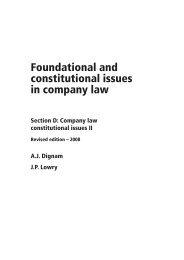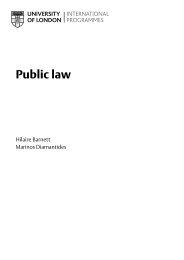Law and policy of international courts and tribunals - University of ...
Law and policy of international courts and tribunals - University of ...
Law and policy of international courts and tribunals - University of ...
You also want an ePaper? Increase the reach of your titles
YUMPU automatically turns print PDFs into web optimized ePapers that Google loves.
<strong>Law</strong> <strong>and</strong> <strong>policy</strong> <strong>of</strong> <strong>international</strong> <strong>courts</strong> <strong>and</strong> <strong>tribunals</strong>: Section B<br />
36<br />
‘During this dispute both parties have called upon the<br />
assistance <strong>of</strong> the Commission <strong>of</strong> the European Communities.<br />
Because <strong>of</strong> the diametrically opposed positions the Parties<br />
took with regard to the required outcome <strong>of</strong> the trilateral<br />
talks which were envisaged, those talks did not succeed.<br />
When, after the present judgment is given, bilateral<br />
negotiations without preconditions are held, both parties can<br />
pr<strong>of</strong>it from the assistance <strong>and</strong> expertise <strong>of</strong> a third party. The<br />
readiness <strong>of</strong> the parties to accept such assistance would be<br />
evidence <strong>of</strong> the good faith with which they conduct bilateral<br />
negotiations in order to give effect to the Judgment <strong>of</strong> the<br />
Court’ (Gabcikovo-Nagymaros case, Judgment, para. 143,<br />
available at http://www.icj-cij.org).<br />
Mediation <strong>and</strong>/or good <strong>of</strong>fices may also play an important role in<br />
the implementation <strong>of</strong> judgments <strong>and</strong> awards. See section 3.3<br />
below.<br />
3.3 Mediation <strong>and</strong> good <strong>of</strong>fices<br />
Essential reading<br />
Merrills, Chapter 2.<br />
Franck, T.M. ‘Administrative Impartiality as Fairness: the UN Secretary-<br />
General’s Good Offices <strong>and</strong> other ‘Third Party’ Functions’ in Franck, T.M.<br />
(ed.) Fairness in International <strong>Law</strong> <strong>and</strong> Institutions. (Oxford: Clarendon Press,<br />
1995).<br />
Useful further reading<br />
An Agenda for Peace, Preventive Diplomacy, Peacemaking <strong>and</strong> Peacekeeping,<br />
Report <strong>of</strong> the Secretary-General pursuant to the statement adopted<br />
by the Summit Meeting <strong>of</strong> the Security Council on 31 January 1992, UN Doc.<br />
A/47/277 (1995), paras 25, 37, available at http://www.un.org/Docs/<br />
SG/agpeace.html.<br />
3.3.1 Features <strong>of</strong> mediation<br />
Mediation involves the intervention <strong>of</strong> a third party, acting as a gobetween<br />
or channel <strong>of</strong> communication for the parties to the dispute<br />
<strong>and</strong>/or seeking actively to assist the parties to resolve their dispute<br />
by making proposals. Merrills notes that the mediator generally<br />
makes proposals informally <strong>and</strong> on the basis <strong>of</strong> information<br />
supplied by the parties, rather than on the basis <strong>of</strong> his or her own<br />
investigations.<br />
Key aspects <strong>of</strong> mediation therefore include:<br />
The involvement <strong>of</strong> a third party (i.e. there must be a willing<br />
third party mediator, acceptable to both parties to the dispute).<br />
The consent <strong>of</strong> the parties to the dispute (i.e. they must request<br />
mediation, or accept an <strong>of</strong>fer <strong>of</strong> mediation by a third party).<br />
The process is essentially non-legal (e.g. the mediator may<br />
informally put forward proposals that may be acceptable to
















